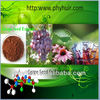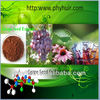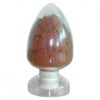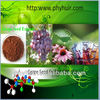- Plant Extract[6]
- Pharmaceutical[6]
- Contact Person : Ms. Liu Lily
- Company Name : Changsha Huir Biological-Tech Co., Ltd.
- Tel : 0086-731-84680108
- Fax : 0086-731-84152788
- Address : Hunan,Changsha,FL20,Jindan Building,No.1 Xiongtian Rd,Longping High-tech Park,Changsha,Chin
- Country/Region : China
- Zip : 410126
Grape seed Extract
Grape seed Extract
Product Specification 95% OPC/ PolyphenolsLatin Name Vitis vinifera.LProduct Type: Light Brown Yellow Powdered ExtractPart of the Plant Used seedtract Method: Grain Alcohol/WaterCAS#: [84929-27-1]
Grape seeds(Vinis vinifera) are an excellent source of oligomeric proanthocyanidins (OPCs) and have been the subject of clinical research in France for their antioxidant activity. Antioxidants play an important role in the development of collagen including skin, connective tissue and vascular walls.* Nature's Way Standardized Grape Seed Extract is a high potency (955) polyphenol extract.
grape seed extract is rich in flavonoids, phytochemicals that have antioxidant properties some consider even greater than the old standbys vitamin C and vitamin E. Antioxidants are believed to prevent and control numerous ailments by safeguarding cells against the ravages of unstable oxygen molecules called free radicals.
The most valuable flavonoids in grape seed extract are procyanidolic oligomers (also known as proanthocyanidins), commonly called PCOs. Beyond their antioxidant powers, PCOs are thought to improve blood circulation and help strengthen blood vessels. These actions benefit people with heart disease and cancer.
An alternative source for PCOs is Pycnogenol (pik-NODGE-en-all), the brand name for a PCO derived from the bark of the maritime pine. Experts compare its health benefits to those of grape seed extract, and in fact many research studies examining the therapeutic effects of PCOs have relied on the use of Pycnogenol. It's more expensive than grape seed extract, however.
Health Benefits
European doctors prescribe PCO-containing drugs for various vascular (vessel) disorders that are likely to benefit from increased blood flow, such as diabetes, leg cramps, varicose veins, arm and leg numbness or tingling and even impotence. Macular degeneration and cataracts--vision-robbers of the elderly--may also improve by means of the extract's effects on circulation.
Disorders such as endometriosis, which are affected by the release of hormone-like substances called prostaglandins, may benefit from the extract's ability to block the release of this pain- and inflammation-causing chemical. Grape seed extract effectively penetrates cell membranes throughout the body with its antioxidant properties. It can even cross into the brain (traversing the blood-brain barrier) to protect brain cells from free-radical damage.
As an ingredient in facial creams, the extract may help maintain skin elasticity; many European skin creams feature grape seed extract for this purpose.
Specifically, grape seed extract may help to:
Prevent heart disease. The risk for heart attack and stroke may be reduced with this potent antioxidant, which is believed to prevent the plaque development that can clog arteries. A recent study of 38 smokers indicates that PCOs may function as effectively as aspirin in keeping blood cells from sticking together and forming blood clots (called an anticoagulant effect). And the PCOs posed no risk of the gastrointestinal irritation or bleeding generally associated with aspirin. Interestingly, another preliminary study using grape seed oil (which is related to grape seed extract) indicates that using 2 tablespoons a day to replace other oils in cooking could increase HDL ("good") cholesterol by 14% and reduce triglycerides by 15% in just four weeks. Minimize fibromylagia damage. Fibromyalgia is an elusive disorder associated with chronic muscle pain and stiffness. The antioxidant power of grape seed extract can help by protecting besieged muscle cells from damage.Deter cancer. The antioxidants in grape seed extract work hard at helping to control cellular damage, routinely hunting down and neutralizing mutations within the genetic material of cells that could lead to tumor formation. The development and progression of cancers of the lung, breast, stomach, prostate, colon, skin and other body parts may be stalled as a result. Fight skin diseases such as psoriasis and eczema. Certain components within the skin--collagen, elastin and hyaluronic acid--participate in keeping it healthy. PCOs help keep these substances in good shape by blocking enzymes that might disrupt their chemical structure. In this way, grape seed extract may be useful in treating inflammatory skin conditions such as psoriasis. Its flavonoids also inhibit allergic reactions that can generate such skin problems as eczema. Slow progression of macular degeneration and cataracts. Grape seed extract improves blood flow in the eye's tiny vessels, where certain eye diseases can cause blockages and impairments that result in vision damage. Cataracts are an example. The extract's antioxidant powers are of particular value in warding off the free-radical damage so frequently cited as the leading cause of macular degeneration. Lessen allergy symptoms. As a natural antihistamine, grape seed extract may help to control the sneezing, congestion and other hallmarks of an allergic reaction. The extract also inhibits the release of chemicals called prostaglandins that can generate inflammation during an allergic response. Working in concert, the nutrient's antihistamine and anti-inflammatory actions can help to keep at bay such allergic responses as hives, hay fever and eczema.Note: Grape seed extract has also been found to be useful for a number of other disorders. For information on these additional ailments, see our Dosage Recommendations Chart for Grape Seed Extract.
Grape seed Extract






